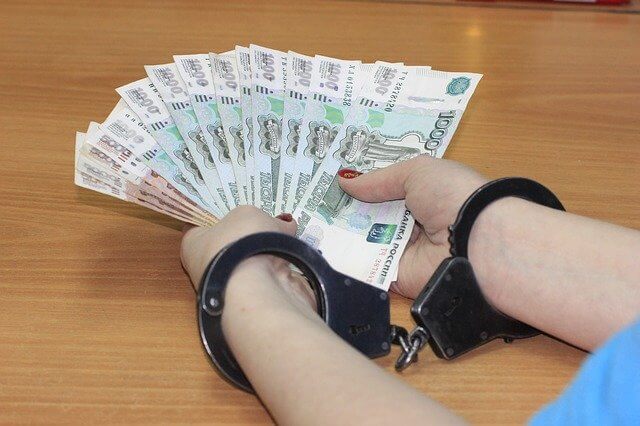Corruption: How Has The Rule Of Law Been Affected

________________________________________________________________________________
This Blog is written by Harshit Rai from Amity Law School, Lucknow. Edited by Pranoy Singhla.
________________________________________________________________________________
INTRODUCTION
Corruption is one of the foremost insidious social phenomena. It erodes trust publicly institutions, hinders economic development and features a disproportionate impact on the enjoyment of human rights, particularly by folks that belong to marginalised or disadvantaged groups such as minorities, people with disabilities, refugees, migrants and prisoners. It also disproportionately affects women, children and other people living in poverty, especially by hampering their access to basic social rights like healthcare, housing and education.
Corruption may be a constant within the society and occurs in nearly every civilization; however, it’s only been within the past 20 years that this phenomenon has begun being seriously explored. It has many different forms and as many various effects, both on the economy and therefore the society at large. Among the foremost common causes of corruption are the political and economic environment, professional ethics and morality and, of course, habits, customs and tradition. Its effects on the economy (and also on the broader society) are well researched, yet still not completely. Corruption thus inhibits economic process and affects business operations, employment and investments. It also reduces tax income and therefore the effectiveness of varied financial assistance programs. The wider society is very much influenced by corruption in terms of lowering of trust within the law and therefore effecting the rule of law, education and consequently the quality of life (access to infrastructure, health care). There also doesn’t exist an unambiguous answer on the way to affect corruption. Something that works in one country or in one region won’t necessarily achieve success in another. This chapter tries to answer a minimum of a couple of questions on corruption and therefore the causes for it, its consequences and the way to affect it successfully.
IMPACT
The impact of corruption is typically considered to be especially pronounced regarding economic, social and cultural rights, although this is often not, in fact, always the case. Economic, social and cultural rights are typically perceived as requiring a greater investment of public resources compared to civil and political rights, which are typically perceived as merely requiring States to refrain from interfering with individual freedoms. However, the belief of all categories of human rights may, in fact, require the allocation of considerable public resources.
Impact of Corruption on–
1. Rights to equality and non-discrimination
The right to equality is mentioned altogether major human rights treaties. Every individual has the proper to be treated equally and without discrimination by the State.
Any distinction, exclusion, restriction or preference which is predicated on any ground like race, colour, sex, language, religion, political or other opinion, national or social origin, property, birth or other status, and which has the aim or effect of nullifying or impairing the popularity, enjoyment or exercise by all persons, on an equal footing, of all rights and freedoms. Corrupt acts are discriminatory in certain situations because they
i) intrinsically distinguish, exclude, restrict or prefer
ii) have the aim or effect of nullifying or impairing the equal recognition, enjoyment or exercise of human rights.
2. Rights to a fair trial and an effective remedy
The right to a good trial may be a fundamental right which is important for safeguarding the rule of law. It incorporates the principle of equality, which underpins the administration of justice. The right to a good trial encompasses an in-depth series of procedural rights, including an independent and impartial tribunal, equality of arms, access to a court, and therefore the presumption of innocence. The right to a good trial is closely associated with the proper to an efficient remedy, because no remedy is effective without equality before the law and fair judicial procedures.
Corruption within the judicial sector damages the proper to a good trial, as corruption erodes the independence, impartiality, and integrity of the judiciary. The lack of independence of judges, prosecutors and lawyers directly harms the right to an honest trial. It limits the effective and efficient administration of justice also because the credibility of the whole justice system. When corruption interferes with the Judiciary i.e., in the appointment of judges and in court proceedings, it violates the impartiality of the judiciary and the fair trial rights of defendants. Individuals also are bereft of equal access to justice when public officials demand bribes as a condition for accessing the judiciary or to hurry up a court service.
CORRUPTION LAWS IN INDIA
Public servants in India are often penalized for corruption under the Indian legal code, 1860 and therefore the Prevention of Corruption Act, 1988. The Benami Transactions (Prohibition) Act, 1988 prohibits benami transactions. The Prevention of cash Laundering Act, 2002 penalises for the offence of cash laundering. India is additionally a signatory to the UN Convention against Corruption since 2005. The Convention covers an honest range of acts of corruption and also proposes certain preventive policies.
Key Features of the Acts associated with corruption:
1. Indian Penal Code, 1860:
• The IPC defines “public servant” as a government employee, officers within the military, navy or air force; police, judges, officers of Court of Justice, and any agency established by a central or state Act.
• Section 169 associates to an employee unlawfully buying or bidding for property. The public servant shall be punished with imprisonment of up to 2 years or with fine or both. If the property is purchased, it shall be impounded.
• Section 409 associates to criminal breach of trust by an employee. The public servant shall be punished with captivity or with imprisonment of up to 10 years and a fine.
2. The Prevention of Corruption Act, 1988:
• Additionally, to the categories included within the IPC, the definition of “public servant” includes office bearers of cooperative societies receiving aid from the govt., employees of universities, banks and Public Service Commission.
• If an employee takes gratification aside from his legal remuneration in respect of a politician act or to influence public servants is liable to minimum punishment for 6 months and maximum punishment for 5 years and fine. The Act also penalizes an employee for taking gratification to influence the overall public by illegal means and for exercising his personal influence with an employee.
• If an employee accepts a valuable thing without paying for it or paying inadequately from an individual with whom he’s involved in a business transaction in his official capacity, he shall be penalized with minimum punishment for 6 months and maximum punishment for 5 years and fine.
• It is necessary to urge prior sanction from the central or government so on prosecute an employee.
3. The Benami Transactions (Prohibition) Act, 1988:
• The Act prohibits any benami transactions except when an individual purchases property in his wife’s or unmarried daughter’s name.
• A person who gets involved with benami transaction shall be punishable with imprisonment of up to 3 years or fine or both.
• All properties that are held to be benami are often acquired by a prescribed authority and no money shall be purchased such acquisition.
4. The Prevention of Money Laundering Act, 2002:
• The Act states that an offence of money laundering has been committed if a private could also be a celebration to any process connected with the proceeds of crime and projects such proceeds as uncorrupted property. “Proceeds of crime” means any property obtained by any individual as a result of criminal acts associated with certain offences listed within the schedule to the Act. A person is often charged with the offence of cash laundering as long as he has been charged with committing a scheduled offence.
• The penalty for committing the offence of cash laundering is rigorous imprisonment for minimum 3 years up to 7 years and a fine of up to Rs 5 lakh. If an individual is convicted of an offence under the Narcotics Drugs and Psychotropic Substances Act, 1985 the term of imprisonment can extend up to 10 years.
• The Adjudicating Authority, appointed by the central government, shall decide whether any of the property attached or seized is involved in concealment. An Appellate Tribunal shall hear appeals against the orders of the Adjudicating Authority and the other authority under the Act.
ANALYSIS
The rule of law is crucial for stable democracy, social justice and domestic peace. Equally important is that the arrogance that citizens have in state institutions and their representatives. Good governance and the fight against corruption require oversight not just from institutions, but also from civil society.
• Corruption is linked to the extent of GDP (the higher the GDP, the lower the speed of corruption).
• Corruption is said to the extent of education (the higher the typical level of education, the lower the extent of corruption).
• Corruption is strongly linked to the geographical location. The highest level of corruption is in Asia (mainly in Central Asia), Africa (North and Central Africa) and South America (according to the Transparency International map).
• Corruption is linked to freedom within the country (personal freedom, freedom of speech, economic freedom, etc.), with reference to the rule of law during a country and inefficiency of public administration, which is usually also locally limited or is inherently corrupt.
CONCLUSION
Corruption causes inefficiency and inequity in the society. It is a symbol that the form of government is working with little concern for the broader public interest. It indicates that the structure of state doesn’t channel private interests effectively. The economic goals of growth, poverty alleviation, and efficient, fair markets are sabotaged by corruption. Corruption erodes political legitimacy and thus the protection of rights. Twenty years into the worldwide fight against corruption, there has been progress in both policy and research, but much remains to be done. Attempts to live corruption – imperfect as they’re – have exposed especially corrupt governments and industries, spurring reform toward transparency and more ethical dealings within the public and private sectors, but most governments still receive failing grades on the control of corruption.
REFERENCES
(2) https://www.prsindia.org/administrator/uploads/general/1302844978_PRS Note on corruption laws.pdf

